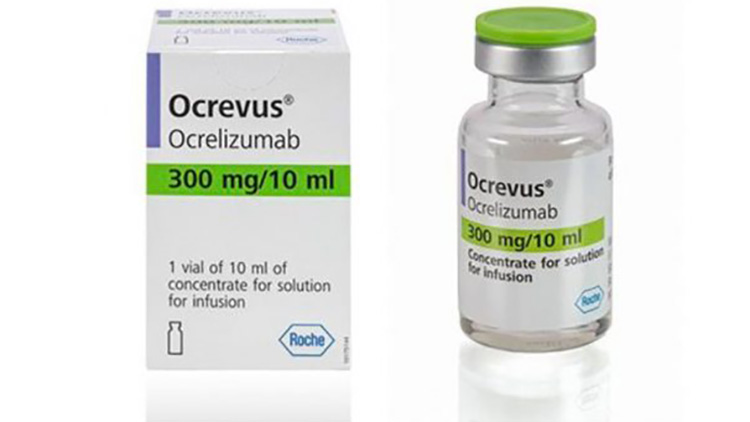Ocrevus (ocrelizumab) vs Tyruko (natalizumab-sztn)
Ocrevus (ocrelizumab) vs Tyruko (natalizumab-sztn)
Ocrevus (ocrelizumab) is a monoclonal antibody that targets CD20-positive B cells, which are thought to play a role in the pathogenesis of multiple sclerosis (MS); it is approved for both relapsing-remitting and primary progressive forms of MS. Tysabri (natalizumab), not Tyruko, is another monoclonal antibody but it targets the cell adhesion molecule α4-integrin, which is involved in the migration of immune cells into the central nervous system; it is indicated for relapsing forms of MS and is generally considered for patients who have not responded adequately to, or cannot tolerate, an alternate MS therapy. When deciding between the two, considerations include the different mechanisms of action, the risk of progressive multifocal leukoencephalopathy (PML) associated with Tysabri, and the overall efficacy and safety profile of each medication, which should be discussed with a healthcare provider to determine the best individual treatment plan.
Difference between Ocrevus and Tyruko
| Metric | Ocrevus (ocrelizumab) | Tyruko (natalizumab-sztn) |
|---|---|---|
| Generic name | Ocrelizumab | Natalizumab-sztn |
| Indications | Primary progressive MS, relapsing-remitting MS | Relapsing forms of MS, Crohn's disease |
| Mechanism of action | CD20-directed cytolytic antibody | Integrin receptor antagonist |
| Brand names | Ocrevus | Tysabri, Tyruko |
| Administrative route | Intravenous infusion | Intravenous infusion |
| Side effects | Infusion reactions, infections, skin reactions | Headache, fatigue, urinary tract infections, liver enzyme elevations, PML |
| Contraindications | Active hepatitis B infection, hypersensitivity to ocrelizumab | Progressive multifocal leukoencephalopathy (PML), hypersensitivity to natalizumab |
| Drug class | Monoclonal antibody | Monoclonal antibody |
| Manufacturer | Genentech (Roche) | Biogen |
Efficacy
Ocrevus (Ocrelizumab) Efficacy in Multiple Sclerosis
Ocrevus (ocrelizumab) is a monoclonal antibody designed to target CD20-positive B cells, which are believed to play a key role in the pathogenesis of multiple sclerosis (MS). The efficacy of Ocrevus for the treatment of MS has been demonstrated in several clinical trials, including the OPERA I and II studies for relapsing forms of MS, and the ORATORIO study for primary progressive MS (PPMS). In these trials, Ocrevus significantly reduced the annualized relapse rate (ARR) in patients with relapsing MS compared to interferon beta-1a, a standard MS therapy. Additionally, Ocrevus was the first therapy to show efficacy in PPMS by slowing the progression of disability, which was a significant breakthrough in the treatment of this MS form.
In terms of specific outcomes, Ocrevus has been shown to reduce the progression of disability, as measured by the Expanded Disability Status Scale (EDSS), and to decrease the number of new or enlarging brain lesions observed on MRI scans. These effects contribute to the overall efficacy of Ocrevus in managing MS and improving the quality of life for patients. The drug's impact on reducing relapse rates and slowing disability progression underscores its value as a treatment option for individuals with both relapsing and primary progressive forms of MS.
Tysabri (Natalizumab) Efficacy in Multiple Sclerosis
Tysabri (natalizumab), another monoclonal antibody, targets the cell adhesion molecule α4-integrin and is used in the treatment of relapsing forms of multiple sclerosis. Tysabri works by inhibiting the movement of potentially damaging immune cells from the bloodstream, across the blood-brain barrier, and into the central nervous system. This mechanism helps reduce inflammation and lesion formation in the brain and spinal cord. The efficacy of Tysabri has been established through clinical trials, including the AFFIRM and SENTINEL studies, where it demonstrated a significant reduction in the annualized relapse rate and a delay in the progression of disability compared to placebo or in combination with interferon beta-1a.
Patients treated with Tysabri have also shown improvements in various MRI measures, including a reduction in the number of new or enlarging T2 hyperintense lesions and a decrease in the volume of T1 hypointense lesions, which are indicative of reduced disease activity and tissue damage. Tysabri's ability to lower relapse rates and slow the accumulation of physical disability has established it as a potent treatment for relapsing-remitting multiple sclerosis (RRMS), particularly in patients with highly active disease or those who have not responded adequately to other treatments. However, it is important to note that the use of Tysabri is associated with an increased risk of progressive multifocal leukoencephalopathy (PML), a rare but serious brain infection, which requires careful risk assessment and monitoring during treatment.
Regulatory Agency Approvals
Ocrevus
-
European Medical Agency (EMA), European Union

-
Food and Drug Administration (FDA), USA

-
Health Canada

-
Therapeutic Goods Administration (TGA), Australia

-
Medsafe (NZ)

Tyruko
-
European Medical Agency (EMA), European Union

-
Food and Drug Administration (FDA), USA

Access Ocrevus or Tyruko today
If Ocrevus or Tyruko are not approved or available in your country (e.g. due to supply issues), you can access them via Everyone.org.
How it works

Make an enquiry
Choose the medicine you want to buy, answer a couple of questions, and upload your prescription to speed things up. We’ll get back to you within 24 hours.


Make an enquiry
Choose the medicine you want to buy, answer a couple of questions, and upload your prescription to speed things up. We’ll get back to you within 24 hours.


Breeze through the paperwork
We'll guide you through the required documents for importing unapproved medicine, ensuring you have all the necessary information.


Get a personalized quote
We’ll prepare a quote for you, including medicine costs and any shipping, administrative, or import fees that may apply.


Receive your medicine
Accept the quote and we’ll handle the rest - sourcing and safely delivering your medicine.

Some text on this page has been automatically generated. Speak to your physician before you start a new treatment or medication.
Let's talk
If you have any questions, call us or send us a message through WhatsApp or email:
Contact us




